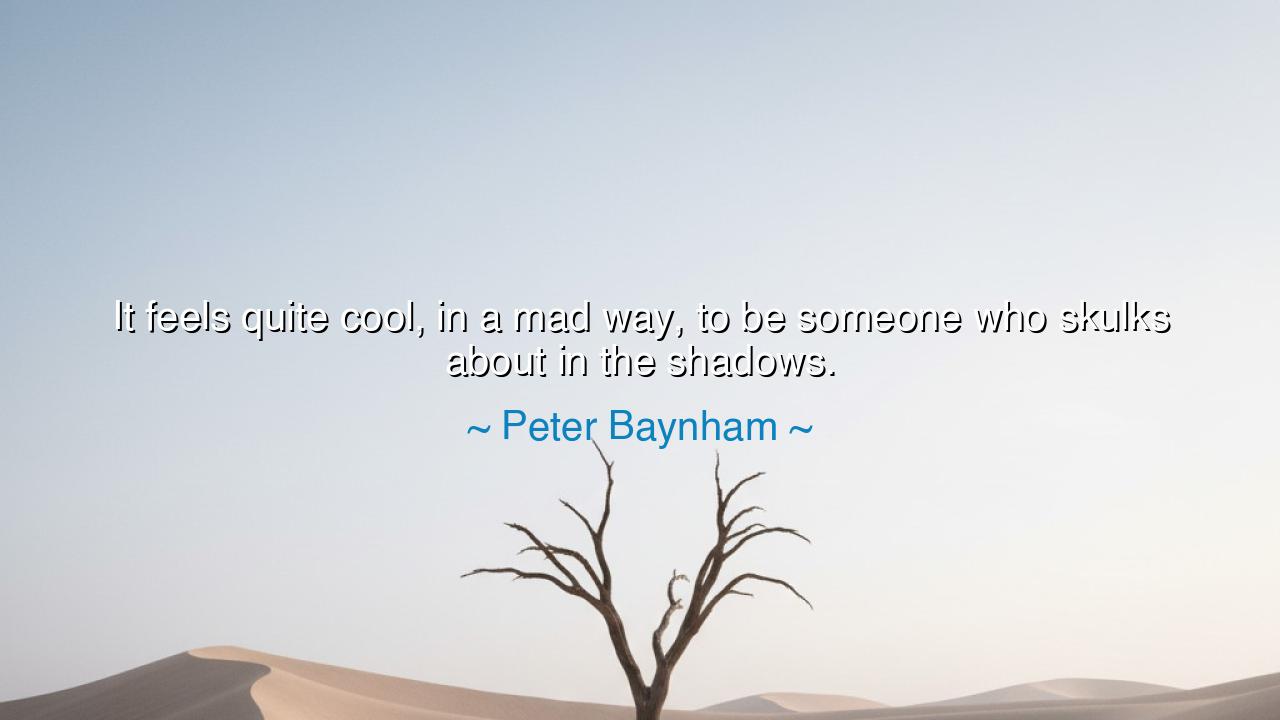
It feels quite cool, in a mad way, to be someone who skulks about






"It feels quite cool, in a mad way, to be someone who skulks about in the shadows." These words by Peter Baynham express a sentiment that resonates deeply within the human spirit: the allure and mystery of remaining in the background, operating in the shadows of society. To skulk about in the shadows is often seen as a position of concealment, one that avoids the glaring light of attention and fame. Yet, in this madness, there is a certain kind of freedom—a power that comes not from being seen, but from being unseen, from controlling what others cannot easily perceive. In Baynham’s reflection, there is an acknowledgment of the paradox that sometimes, to remain hidden is to find a sense of empowerment and coolness.
In the ancient world, there was a similar fascination with the shadow—a space where mystery and control met. Odysseus, the great hero of Homer’s Odyssey, often found himself in situations where he had to act in secret, using wit and stealth to overcome enemies far stronger than himself. His ability to move quietly, to hide in the shadows of the larger world, was one of his greatest strengths. In his encounters with gods, monsters, and mortals, Odysseus understood that visibility could often be a curse, and that sometimes, true power lay in concealment. He embodied the wisdom of the shadow, where being unseen often allowed him to shape his destiny from the shadows without ever drawing attention to himself.
Likewise, in ancient Rome, the Senate and the emperors were no strangers to the power of invisibility. The emperor Augustus, while being one of the most visible figures in history, understood the value of subtlety and concealment. Augustus famously reformed Rome from behind the scenes, promoting his image and power without always stepping into the direct light. His control of public perception was key to his success, and in many ways, he was a master of working in the shadows of public life. Much like Baynham’s perspective on the shadow, Augustus knew that quiet influence often achieves more than the overt pursuit of glory.
This concept of hidden power can also be seen in the philosophical tradition. Socrates, one of the greatest thinkers of ancient Greece, often disguised his wisdom under the guise of ignorance. He would wander through the streets of Athens, engaging in conversations and asking questions that subverted the norms of his society. Socrates never sought the limelight or fame; rather, he found power in humility and questioning. His wisdom was not shouted from the rooftops but quietly interwoven into the daily interactions of life. Socrates, much like Baynham’s figure in the shadows, worked in the background, using the power of invisibility to bring about profound change.
Baynham’s words remind us of a deep truth: there is a certain peace in operating away from the spotlight, and coolness in embracing the mystery that comes with being hidden. The Stoics, like Seneca, taught that true contentment does not come from external accolades or public recognition, but from within—from self-mastery and inner strength. Seneca lived his life in relative obscurity, and yet his writings and philosophy have outlasted empires. His influence was not in being the loudest voice in the room, but in offering quiet wisdom that resonated deeply with those who were ready to hear it. In this way, the shadow can be a space of profound power—a place where one’s influence grows not through visible force, but through quiet wisdom and thoughtfulness.
The lesson from Baynham’s reflection is one of embracing invisibility and self-control. Not every path to greatness requires the bright light of public attention; indeed, some of the most powerful actions in history have been those taken in the shadows, where the true force of influence is wielded without ever needing to announce itself. Like Odysseus, Augustus, and Socrates, we can learn that there is great strength in the subtle art of moving unseen, in choosing when to act and when to remain hidden, letting our actions speak louder than our presence.
In practical terms, we can apply this lesson by embracing quiet influence in our daily lives. Whether in our professional careers, our communities, or our relationships, we can choose to lead not through overt displays of power, but through wisdom, patience, and humility. We can choose when to stand in the light, and when to step back, knowing that sometimes, the greatest impact is made in the quiet moments, in the spaces where our presence is not required but felt. Let us be like those ancient figures who knew that true greatness does not always need to be seen—it is often felt in the silence between the actions, in the shadow, where influence is cultivated with care and purpose.






AAdministratorAdministrator
Welcome, honored guests. Please leave a comment, we will respond soon